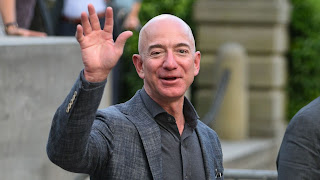Introduction Of Amazon:
 |
Jeff Bezos
Image Courtesy Forbes |
Amazon is a well-known multinational company that has transformed the retail industry. Founded in 1994 by Jeff Bezos, Amazon started as an online bookstore, but today, it has expanded to various industries, including retail, cloud computing, advertising, and artificial intelligence. Amazon has become a household name, and its success can be attributed to its unique business model. In this article, we will explore what Amazon is and its various business models.
What Is Amazon?
Amazon is an American multinational technology company that is headquartered in Seattle, Washington. The company is primarily focused on e-commerce, but it has also expanded to other industries such as cloud computing, artificial intelligence, and advertising. Amazon is considered to be one of the "Big Five" technology companies, alongside Google, Apple, Facebook, and Microsoft.
Amazon started as an online bookstore in 1994, and it quickly expanded to other product categories such as electronics, clothing, and home goods. Today, Amazon is the largest online retailer in the world, and it has a market capitalization of over $1.5 trillion. Amazon has disrupted the traditional retail industry by offering a vast selection of products, competitive pricing, and fast delivery.
Amazon's Business Model:
Amazon's business model is centered around the customer, and it has several key components that contribute to its success. These components include:
Customer-Centricity: Amazon's business model is centered around the customer, and the company's mission is to be the "earth's most customer-centric company." This means that Amazon is focused on providing the best possible customer experience, from the selection of products to the delivery process.
Marketplace: Amazon operates a marketplace where third-party sellers can sell their products directly to customers. This has allowed Amazon to expand its product selection and offer a wider range of products to customers.
Prime Membership: Amazon offers a subscription service called Amazon Prime, which provides customers with free two-day shipping, access to streaming of movies, TV shows, and music, and other benefits. Prime membership has been a key driver of customer loyalty for Amazon.
Fulfillment By Amazon (FBA): FBA is a service offered by Amazon where sellers can store their inventory in Amazon's warehouses, and Amazon handles the shipping and customer service. This has allowed sellers to focus on growing their business while Amazon handles the logistics.
Data-Driven Decision-Making: Amazon uses data extensively to make decisions, from the selection of products to the pricing and delivery methods. This allows Amazon to optimize its operations and provide the best possible customer experience.
Types of Business Models on Amazon
1. Retail Business Model:
Amazon's primary business model is retail, and it operates both as a first-party seller and a third-party marketplace. As a first-party seller, Amazon purchases products from manufacturers and sells them directly to customers. As a third-party marketplace, Amazon allows other sellers to sell their products directly to customers through the Amazon platform.
Amazon's retail business model has several advantages. Firstly, Amazon has a vast selection of products, and it can offer competitive pricing due to its scale. Secondly, Amazon's fulfillment network allows for fast and reliable delivery, which has been a key driver of customer loyalty. Thirdly, Amazon's use of data allows it to optimize its product selection, pricing, and delivery methods to provide the best possible customer experience.
2. Subscription Business Model:
Amazon's subscription business model is centered around Amazon Prime, which provides customers with a range of benefits, including free two-day shipping, access to streaming of movies, TV shows, and music, and other benefits. Amazon Prime has been a key driver of customer loyalty for Amazon, and it has contributed to the company's success.
The subscription business model has several advantages. Firstly, it provides a predictable revenue stream, as customers pay a monthly or annual fee for the subscription. Secondly, it can increase customer loyalty, as customers are more likely to continue using a service they are paying for. Finally, it can help to differentiate a company from competitors and provide a unique value proposition to customers.
3. Advertising Business Model:
Amazon's advertising business model is focused on providing advertising services to third-party sellers on the Amazon platform. Amazon offers a range of advertising solutions, including sponsored products, sponsored brands, and sponsored display ads.
The advertising business model has several advantages. Firstly, it provides a new revenue stream for Amazon, as the company charges sellers for advertising services. Secondly, it can help sellers to increase visibility and sales on the Amazon platform. Finally, it allows Amazon to leverage its vast amounts of customer data to provide targeted advertising solutions.
4. Cloud Computing Business Model:
Amazon's cloud computing business model is centered around Amazon Web Services (AWS), which provides a range of cloud computing services to businesses and individuals. AWS allows customers to store data, run applications, and access computing resources on a pay-as-you-go basis.
The cloud computing business model has several advantages. Firstly, it provides a new revenue stream for Amazon, as the company charges customers for using AWS services. Secondly, it allows Amazon to leverage its expertise in infrastructure and technology to provide a best-in-class cloud computing solution. Finally, it can help businesses to reduce costs and increase scalability by outsourcing their computing needs to AWS.
 |
| An Image Of Amazon Warehouse In The USA |
Conclusion:
Amazon has transformed the retail industry with its unique business model that is centered around the customer. The company's success can be attributed to its vast selection of products, competitive pricing, and fast delivery. Amazon has also expanded to other industries, including cloud computing, advertising, and artificial intelligence. Amazon's business model is constantly evolving, and the company continues to innovate to provide the best possible customer experience.





Comments
Post a Comment